Are you a member of the LGBTQ+ community in the U.S. dreaming of experiencing the vibrant culture of Cuba? The answer is yes, you can travel to Cuba from Mexico, and gaymexico.net is here to guide you through the process. Discover the best LGBTQ+-friendly travel options, visa information, and tips for a safe and unforgettable trip. Explore the latest travel guidelines, cultural insights, and resources for LGBTQ+ travelers on gaymexico.net, ensuring a seamless journey.
1. Can Americans Travel to Cuba?
Yes, Americans can travel to Cuba. Here’s how:
There are two primary ways for Americans to travel to Cuba: legally with a Cuban visa or by traveling through another country like Mexico. Although regulations exist, traveling to Cuba is possible for U.S. citizens, with several options for obtaining the necessary travel documents and licenses. Whether you choose to secure a visa in advance or travel via another country, preparation is critical.
2. Can Americans Travel to Cuba in 2024 (COVID Entry Requirements)?
As of April 2024, there are no COVID-related entry requirements for Cuba.
A negative test or proof of vaccination is no longer required to enter Cuba. You can find more specific information from the U.S. State Department.
3. How Do I Get a Visa to Cuba as an American?
To visit Cuba legally as an American, you need to obtain a Cuban visa in advance, also called a “general license.”
The Office of Foreign Assets Control (OFAC) determines 12 categories for your general license:
- Family visits
- Official U.S. government business, foreign governments, and certain intergovernmental organizations
- Journalistic activity
- Professional research and meetings
- Educational activities
- Religious activities
- Public performances, clinics, workshops, athletic and other competitions, and exhibitions
- Support for the Cuban people
- Humanitarian projects
- Activities of private foundations or research or educational institutes
- Exportation, importation, or transmission of information or informational materials
- Certain export transactions
4. What Is the Best Way to Get a General License?
If you want to visit Cuba as a tourist, get a general license under the “Support for the Cuban people” travel category.
This can be achieved by working with a company like ViaHero, which builds custom itineraries designed by locals. ViaHero can book your transportation in Cuba and guide you through getting your Cuban visa. If you have a visa, you can fly directly to Cuba from the United States. There are flights from Miami, New York, Fort Lauderdale, and Atlanta.
5. Can I Fly to Cuba From the US?
Yes, there are nonstop flights to Havana from cities like Miami, New York, Fort Lauderdale, and Atlanta.
However, you must have a visa to Cuba to take these flights. When flying to Cuba from the United States, you’ll need to pick up the “pink tourist card” at the airport at check-in or at the ticket office of your airline.
6. Visiting Cuba as an American Without a Visa or General License
Another way to visit Cuba as an American is to fly into another country and book a separate flight to Cuba from there, which exists in a legal gray area.
Cancún is a popular option. Flights from Cancún to Havana take just over an hour. You can also fly to Havana from Mexico City, Mérida, and several other cities in Mexico and cities like Toronto.
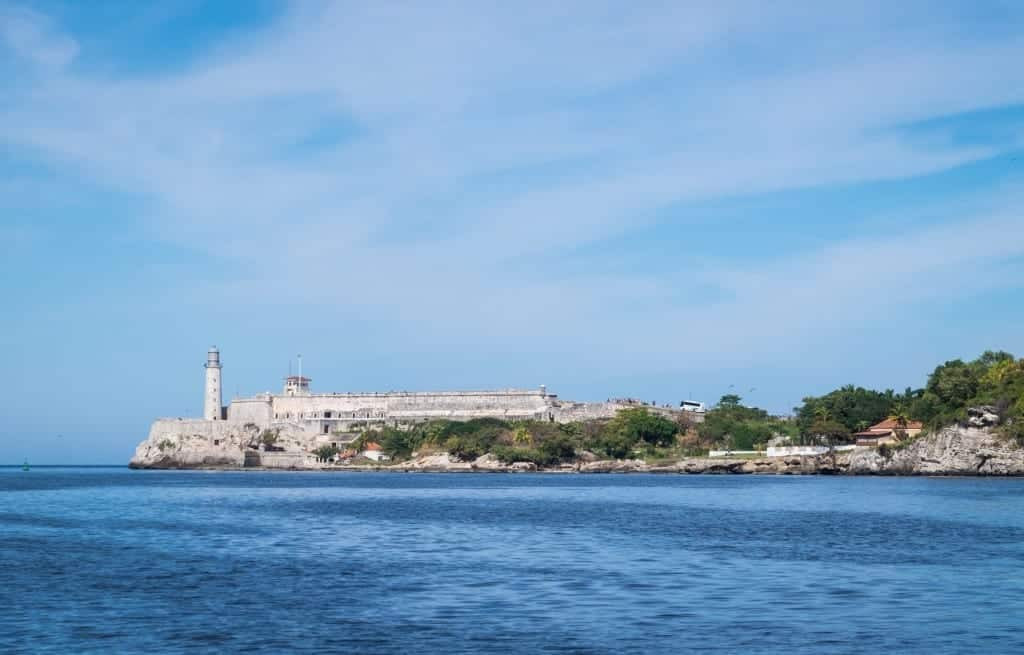 A view of the lighthouse on the ocean in Havana underneath a blue sky.
A view of the lighthouse on the ocean in Havana underneath a blue sky.
If you choose to visit Cuba this way, you won’t need a visa in advance. You only need the Cuban tourist card, sometimes called the “green tourist card.” You can pick this up at the airport at your airline’s ticket office. In Cancún’s airport, Interjet sells the tourist cards where you check in for the Havana flight. Cuban immigration does not care if you show up without an American visa. The only thing they care about is the tourist card. Cuba won’t stamp your passport if you don’t want them to.
7. What Else Do Americans Need to Know Before Visiting Cuba?
Here are some additional tips for Americans visiting Cuba:
- Travel insurance is required.
- Americans can’t spend money at Cuban establishments on the restricted list.
- Keep your receipts, as the U.S. government can ask for them up to five years after your return.
8. Money in Cuba as an American
Americans cannot make financial transactions in Cuba. You can’t use ATMs, debit cards, or credit cards, even with a visa. You must bring all the cash you’ll need for your entire stay.
Bring US dollars or Euros and exchange them on the ground. You can exchange money at banks, but there are often long lines. Exchanging money at your accommodation is best. Avoid exchanging money at the airport, as you’ll pay a much worse exchange rate. If you are traveling solo, keep enough U.S. dollars for transportation to Havana Airport and a flight to Cancún in your underwear at all times. Keep your cash stowed safely using a Speakeasy Travel Supply scarf.
Cuba has two currencies: Cuban Convertible Peso (CUC) and Cuban National Peso (CUP). Travelers will use CUC, valued to the U.S. dollar. CUP are valued at 24 to the CUC and are primarily used by locals. CUC has monuments, while CUP has faces. Get rid of your Cuban currency before returning to the U.S., as you won’t be able to exchange it at U.S. banks.
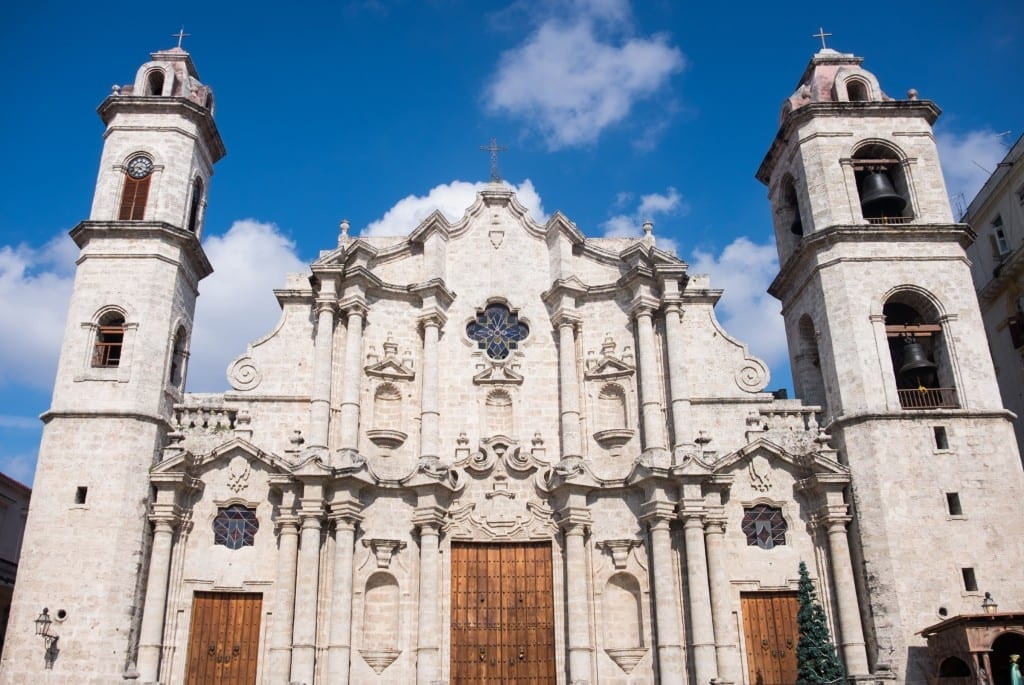 A church in Old Havana, set against a blue sky.
A church in Old Havana, set against a blue sky.
9. Where Can I Stay in Cuba?
Hotels exist in Cuba, but for a more local experience, stay in casas particulares.
Casas particulares are rooms or entire apartments in private homes that Cubans rent out to visitors. They are often quite cheap, usually around $25 per room. Casas particulares can be found through Airbnb. The great thing about casas particulares is that they’ll hook you up with the rest of your stay and can organize transportation, tours, and currency exchange.
10. What Is Havana Like?
Classic cars lining the streets, crumbling colonial buildings, and salsa bands capture the city’s essence.
Here are some Cuban observations:
- Cubans come in every color of the rainbow.
- The classic cars really are a thing in Cuba, with many Russian cars.
- Cubans have an interesting accent, dropping the letter s often.
- Cubans really love their Havana Club rum. Try a Havana Special cocktail.
- Throughout Havana, you see vegetable carts pushed through the street laden with onions, peppers, and tomatoes.
- Cubans love their NBA jerseys, mostly Michael Jordan jerseys.
- Grocery stores are sparse, with mostly empty shelves. You see zero American brands.
- Many Cubans are rough with their dogs.
- Every Cuban is a talented singer, dancer, or musician.
11. Cuban Conversations: What Do Cubans Think About Americans?
During a seafood cooking class in Central Havana, the instructor, Odalys, and her translator, Ivan, provided insights into Cuban life and views on Americans.
Ivan mentioned that Cubans have always loved Americans and dislike their president, mentioning that, despite Obama’s efforts, it “made no difference to us.”
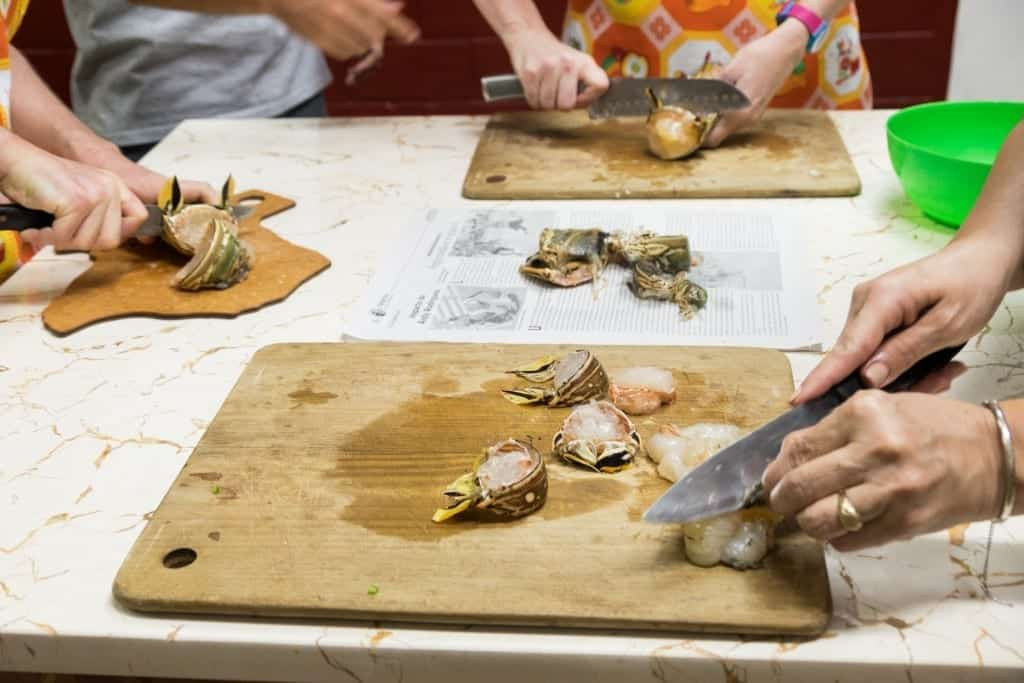 Three sets of hands chopping the raw lobster, still in its shell.
Three sets of hands chopping the raw lobster, still in its shell.
12. Airbnb in Cuba, and Economic Opportunity
In 2022, the average monthly salary in Cuba was estimated to be $175 per month, which is why tourism is so critical.
Airbnb provides incredible economic opportunity for locals who are limited in their earning power. However, travelers must use Airbnb responsibly.
13. How Can I Use Internet in Cuba?
“Free wifi” means there’s a wifi network nearby that you can use with wifi cards.
You can get them at the local Etecsa store or some hotels for $1 per hour. You can easily tell a wifi hotspot in Cuba because you’ll see people clustered around and absorbed in their phones.
Do not touch any banking sites or apps while you’re in Cuba, including sites like Paypal and Venmo, or your account will be frozen.
14. Karaoke in Cuba
Karaoke is not much of a thing in Cuba, but you can find a bar, La Esencia in Vedado, that has karaoke starting at 9:00 PM on Wednesdays. The English songbook has the songs and artists out of order, making hilarious pairings.
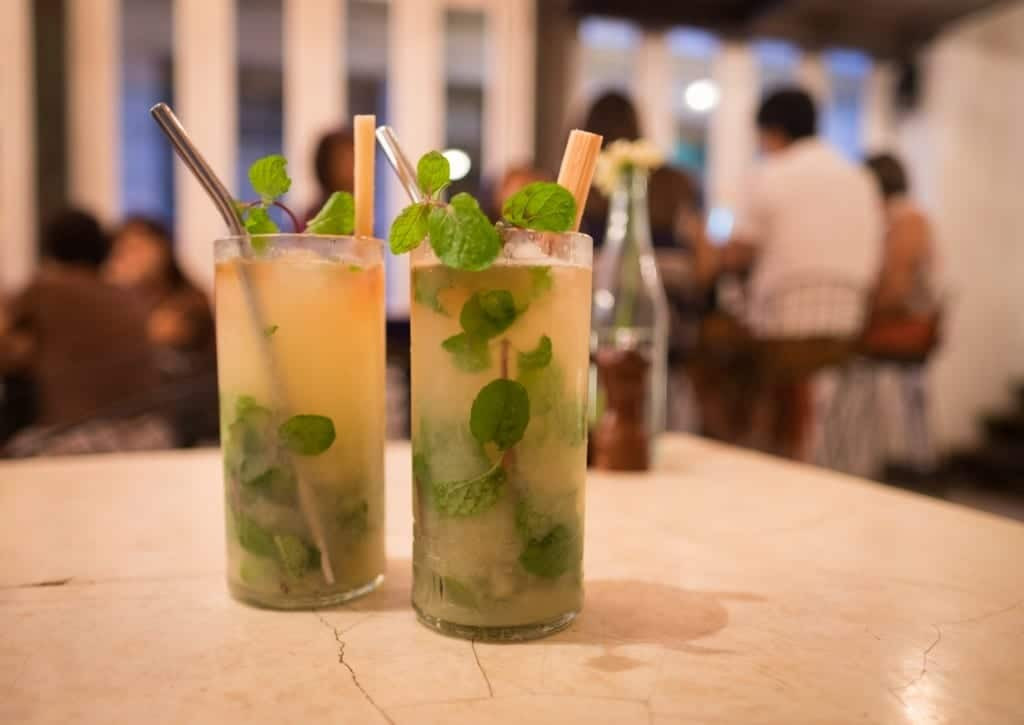 Mojitos in a bar.
Mojitos in a bar.
15. Cuba Is a Hard Place to Travel
Cuba can be a challenging place to travel, with constant offers of taxis, catcalls, and broken streets and sidewalks. It is noisy, hot, and unpleasant smells permeate the air. Classic cars produce a disgusting amount of exhaust. Finding decent food can be difficult.
The need to escape the madness each day is felt, as well as feeling vulnerable as an American in Cuba, with no way to access money in an emergency. Getting stranded with no money is a constant worry.
16. Viñales
Viñales can save the trip to Cuba.
You’ll need to book a bus or take a colectivo, a shared private vehicle. Buses to Viñales have been sold out for a long time, so ask a taxi driver for a colectivo. The drive offers some of the most beautiful verdant scenery, mountains that look like the limestone karats of southern Thailand, and bright green fields of tobacco. Viñales is a small town with casas particulares, restaurants, and bars. Tour the surrounding area with a local guide and learn how coffee and rum are made and buy these products to take home.
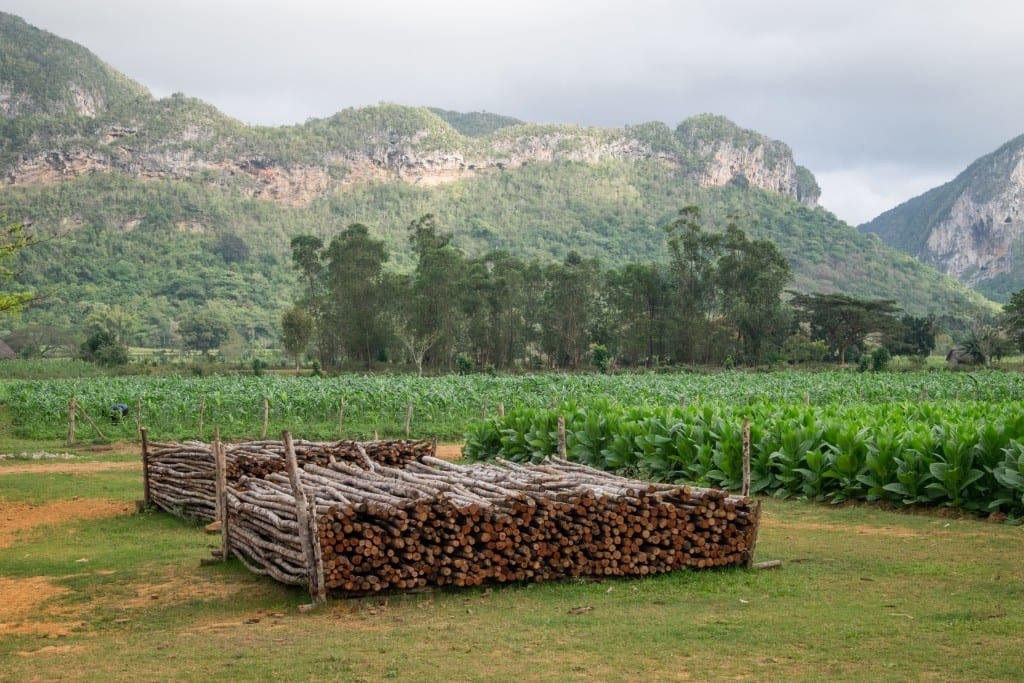 Rows of stacked wood in front of the mountains of Vinales and tobacco fields.
Rows of stacked wood in front of the mountains of Vinales and tobacco fields.
17. Traveling to Cuba: The Takeaway
There is absolutely no reason for the ban on travel to Cuba today. It is a ridiculous grudge that the U.S. government has held for more than 60 years.
Cuba is not a threat, and this embargo serves nobody. As far as travel to Cuba goes, I would recommend doing things a bit differently. Five days was way too long for Havana; I think you’re better off with two full days. I’d even recommend staying in a posh neighborhood like Vedado, away from the chaos of Old Havana.
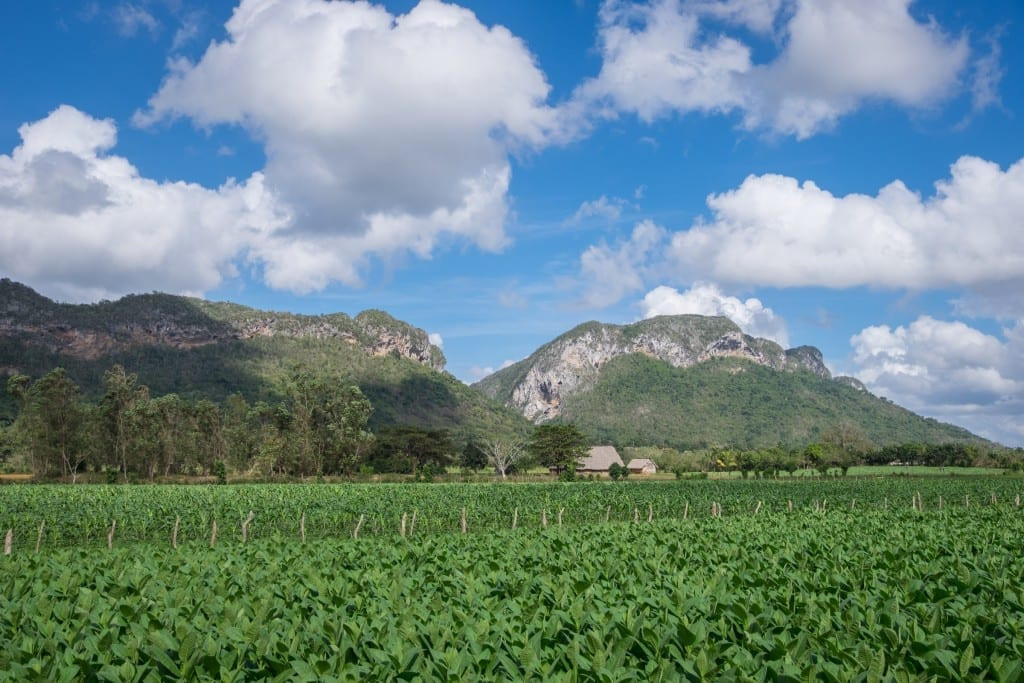 Tobacco fields and mountains underneath a blue sky with puffy clouds.
Tobacco fields and mountains underneath a blue sky with puffy clouds.
18. Don’t Mention Cuba to Your Bank
Be careful how you talk about Cuba afterward.
Turns out you can’t say Cuba anywhere. Lesson learned — Americans can travel to Cuba, but be careful how you talk about it afterward.
19. LGBTQ+ Considerations for Traveling to Cuba
While Cuba has made strides in LGBTQ+ rights, it’s essential to be aware of the current social climate.
According to Human Rights Watch, Cuba has made significant progress in LGBTQ+ rights, including legalizing same-sex marriage and prohibiting discrimination based on sexual orientation. However, societal attitudes may still vary, and public displays of affection might attract unwanted attention in certain areas.
20. LGBTQ+ Travel Tips for Cuba
Here are some tips to ensure a safe and enjoyable trip:
- Research LGBTQ+-friendly accommodations and venues in advance.
- Be mindful of local customs and traditions.
- Connect with LGBTQ+ locals for insights and recommendations.
- Stay informed about current events and any potential safety concerns.
- Consider joining LGBTQ+ tours or activities to meet like-minded travelers.
21. Is Cuba Safe for LGBTQ+ Travelers?
Cuba is generally considered safe for LGBTQ+ travelers, but exercising caution is always advised.
While the legal framework protects LGBTQ+ individuals from discrimination, societal acceptance may still be evolving. By staying informed, being respectful, and connecting with local LGBTQ+ communities, you can ensure a positive and memorable experience.
22. What Are the Top LGBTQ+ Destinations in Mexico?
Mexico boasts several vibrant LGBTQ+-friendly destinations.
Puerto Vallarta, Mexico City, and Guadalajara are known for their welcoming atmosphere and thriving LGBTQ+ scenes. gaymexico.net offers detailed guides and resources to help you explore these destinations and discover the best gay bars, clubs, hotels, and events.
23. How Can gaymexico.net Help Me Plan My Trip?
gaymexico.net is your comprehensive resource for LGBTQ+ travel in Mexico and beyond.
We offer a wealth of information, including destination guides, event listings, travel tips, and community resources. Whether you’re looking for the best gay bars in Puerto Vallarta or seeking advice on navigating LGBTQ+ culture in Mexico City, gaymexico.net has you covered.
24. Key Differences: Traveling to Cuba From Mexico vs. the US
Traveling to Cuba from Mexico offers distinct advantages compared to traveling directly from the United States.
The primary difference lies in the legal requirements and restrictions imposed by the U.S. government. Traveling through Mexico can bypass some of these restrictions, offering a more straightforward route to Cuba.
25. What Are the Benefits of Traveling to Cuba From Mexico?
Opting to travel to Cuba from Mexico can simplify the travel process.
By flying from Mexico, you can avoid the need for a specific U.S. travel license, such as the “Support for the Cuban People” license. You’ll typically only need a Cuban Tourist Card (Tarjeta del Turista), which is easily obtainable at most Mexican airports that offer flights to Cuba.
26. Planning My Trip: What Do I Need to Consider?
When planning a trip to Cuba from Mexico, consider the following:
- Flights: Several airlines offer regular flights from major Mexican cities to Havana and other Cuban destinations.
- Tourist Card: Ensure you purchase a Cuban Tourist Card at the Mexican airport before boarding your flight.
- Currency: Remember that U.S. credit and debit cards generally do not work in Cuba, so bring enough cash to cover your expenses.
- Accommodation: Book your accommodation in advance, considering casas particulares (private homestays) for a more authentic experience.
- Activities: Plan your itinerary to include cultural experiences, such as visiting historic sites, enjoying live music, and exploring local cuisine.
27. What Cultural Experiences Should I Not Miss in Cuba?
Cuba is rich in culture and history.
Don’t miss the chance to explore Old Havana, a UNESCO World Heritage site, and visit iconic landmarks such as the Plaza de la Revolución and the Malecón. Immerse yourself in the local music scene by attending a salsa or jazz performance.
28. Essential Packing List for Cuba
Packing for Cuba requires some special considerations:
- Cash: Bring enough cash in Euros or Canadian dollars to exchange, as U.S. dollars may incur additional fees.
- Travel Insurance: Ensure your travel insurance covers medical expenses and other emergencies in Cuba.
- Medications: Pack any necessary prescription medications, as access to certain medications may be limited.
- Toiletries: Bring essential toiletries, as they may be difficult to find in Cuba.
- Adapter: Cuba uses both 110V and 220V outlets, so bring a universal adapter if needed.
29. Navigating Currency Exchange and Finances in Cuba
Understanding the currency exchange system in Cuba is crucial.
Cuba has two official currencies: the Cuban Peso (CUP) and the Cuban Convertible Peso (CUC). However, the CUC is no longer in circulation. Tourists primarily use CUP. Exchange your currency at official exchange houses (CADECA) or banks to get the best rates.
30. Staying Connected: Internet and Communication
Internet access in Cuba can be limited.
Wi-Fi is available in some hotels, parks, and public spaces, but you’ll typically need to purchase a prepaid card to access it. Consider purchasing a local SIM card if you need more reliable internet access.
31. What Are Some Common Scams to Be Aware Of?
While Cuba is generally safe, it’s wise to be aware of common scams:
- Fake Cigars: Be cautious when buying cigars from unofficial vendors, as they may be counterfeit.
- Taxi Overcharges: Agree on a fare with taxi drivers before starting your journey.
- “Helpful” Locals: Be wary of overly helpful locals offering unsolicited services, as they may expect payment.
32. How Can I Support the Cuban People During My Trip?
Supporting the Cuban people is an important aspect of responsible travel.
Here are some ways to do so:
- Stay in Casas Particulares: Support local families by staying in private homestays rather than government-owned hotels.
- Eat at Paladares: Dine at privately owned restaurants (paladares) to support local entrepreneurs.
- Buy Local Art and Crafts: Purchase souvenirs from local artisans and craftspeople.
- Engage in People-to-People Activities: Participate in cultural exchanges and educational activities to connect with Cuban communities.
33. What Are Some Must-Try Cuban Dishes?
Cuban cuisine is a delightful blend of Spanish, African, and Caribbean influences.
Be sure to try these must-try dishes:
- Ropa Vieja: Shredded beef stewed in tomato sauce with onions, peppers, and spices.
- Moros y Cristianos: Black beans and rice, a staple of Cuban cuisine.
- Lechón Asado: Roasted pork, often marinated in mojo sauce.
- Tostones: Fried plantains, a popular side dish.
- Cuban Sandwich: A pressed sandwich filled with roasted pork, ham, Swiss cheese, pickles, and mustard.
34. Getting Around Cuba: Transportation Options
Cuba offers various transportation options:
- Taxis: Taxis are readily available in major cities, but be sure to negotiate the fare in advance.
- Buses: Viazul buses are a reliable option for long-distance travel between cities.
- Collectivos: Shared taxis (colectivos) are a more affordable option for traveling between cities.
- Car Rental: Renting a car can offer flexibility, but be prepared for challenging road conditions and limited availability.
35. How Can I Learn Some Basic Spanish Phrases Before My Trip?
Learning a few basic Spanish phrases can enhance your travel experience.
Here are some essential phrases:
- Hola: Hello
- Gracias: Thank you
- Por favor: Please
- De nada: You’re welcome
- ¿Cuánto cuesta?: How much does it cost?
- ¿Dónde está…?: Where is…?
- No hablo español: I don’t speak Spanish
36. What Are Some Popular Day Trips From Havana?
Havana makes a great base for exploring other parts of Cuba.
Consider these popular day trips:
- Viñales Valley: A picturesque region known for its tobacco farms and stunning landscapes.
- Varadero: A popular beach resort town with crystal-clear waters and white-sand beaches.
- Playas del Este: A string of beaches located east of Havana, offering a more relaxed atmosphere.
37. What Are Some Safety Tips for Traveling in Cuba?
Cuba is generally a safe country for tourists.
Here are some safety tips to keep in mind:
- Be Aware of Your Surroundings: Pay attention to your surroundings and avoid walking alone in poorly lit areas at night.
- Protect Your Belongings: Keep your valuables secure and avoid displaying expensive jewelry or electronics.
- Be Cautious with Strangers: Be wary of overly friendly strangers who may have ulterior motives.
- Stay Hydrated: Drink plenty of water to avoid dehydration, especially in the hot and humid climate.
38. Connecting With the Local LGBTQ+ Community in Cuba
Connecting with the local LGBTQ+ community can enrich your travel experience.
Consider visiting LGBTQ+-friendly venues and events, and reach out to local LGBTQ+ organizations for information and support.
39. Important Cultural Considerations for LGBTQ+ Travelers
While Cuba has made progress in LGBTQ+ rights, it’s important to be aware of cultural nuances.
Public displays of affection may not be as widely accepted as in some other countries. Be respectful of local customs and traditions, and exercise discretion when expressing your identity.
40. What Resources Are Available for LGBTQ+ Travelers in Cuba?
Several resources are available to support LGBTQ+ travelers in Cuba.
gaymexico.net offers a wealth of information and resources, including destination guides, event listings, and community connections.
FAQ: Traveling to Cuba From Mexico
Here are some frequently asked questions about traveling to Cuba from Mexico:
- Do I need a visa to travel to Cuba from Mexico? Yes, you need a Cuban Tourist Card (Tarjeta del Turista), which can be purchased at most Mexican airports that offer flights to Cuba.
- Can I use U.S. credit cards in Cuba? No, U.S. credit and debit cards generally do not work in Cuba, so bring enough cash to cover your expenses.
- Is Cuba safe for LGBTQ+ travelers? Cuba is generally considered safe for LGBTQ+ travelers, but exercising caution is always advised.
- What currency should I bring to Cuba? Bring Euros or Canadian dollars to exchange, as U.S. dollars may incur additional fees.
- How can I support the Cuban people during my trip? Stay in casas particulares, eat at paladares, and buy local art and crafts to support local communities.
- What are some must-try Cuban dishes? Try ropa vieja, moros y cristianos, lechón asado, tostones, and the Cuban sandwich.
- What are some popular day trips from Havana? Consider visiting Viñales Valley, Varadero, or Playas del Este.
- How can I learn some basic Spanish phrases before my trip? Use online resources or language learning apps to learn essential phrases.
- What resources are available for LGBTQ+ travelers in Cuba? gaymexico.net offers a wealth of information and resources for LGBTQ+ travelers in Cuba.
- Where can I find reliable information about current travel restrictions and requirements for Cuba? Consult the U.S. Department of State website or the Cuban Embassy website for the most up-to-date information.
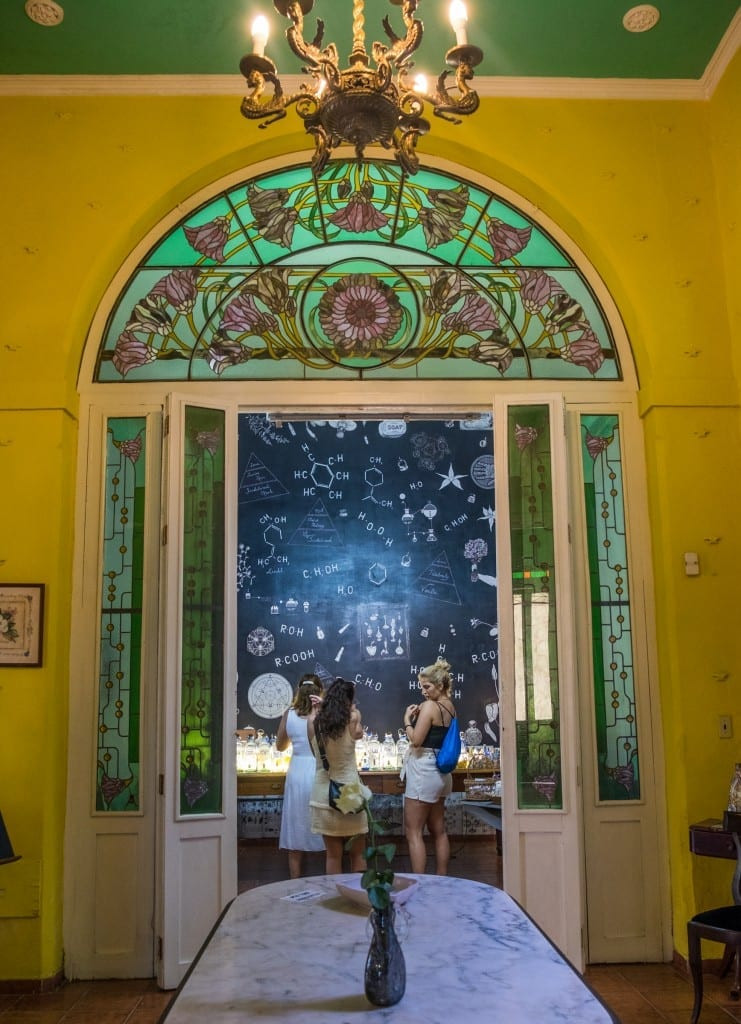 Green and purple stained glass windows in the Museum of Perfume, Havana
Green and purple stained glass windows in the Museum of Perfume, Havana
Planning a trip to Cuba from Mexico as an LGBTQ+ traveler can be an exciting and rewarding experience. By staying informed, being respectful, and connecting with local communities, you can ensure a safe and memorable journey.
Ready to explore the best of LGBTQ+ Mexico and plan your trip to Cuba? Visit gaymexico.net today to discover detailed travel guides, insider tips, and community resources. Connect with us and start your adventure now Address: 3255 Wilshire Blvd, Los Angeles, CA 90010, United States. Phone: +1 (213) 380-2177. Website: gaymexico.net.
